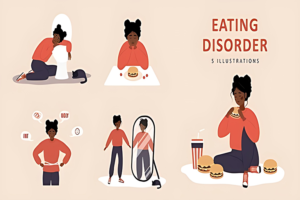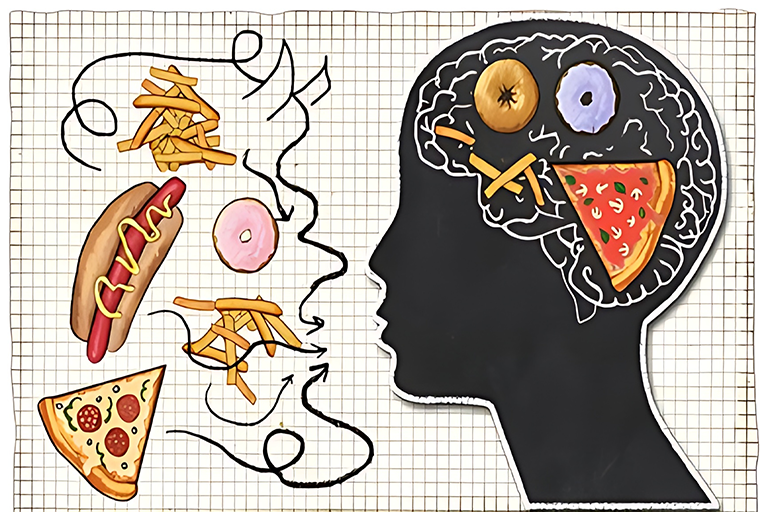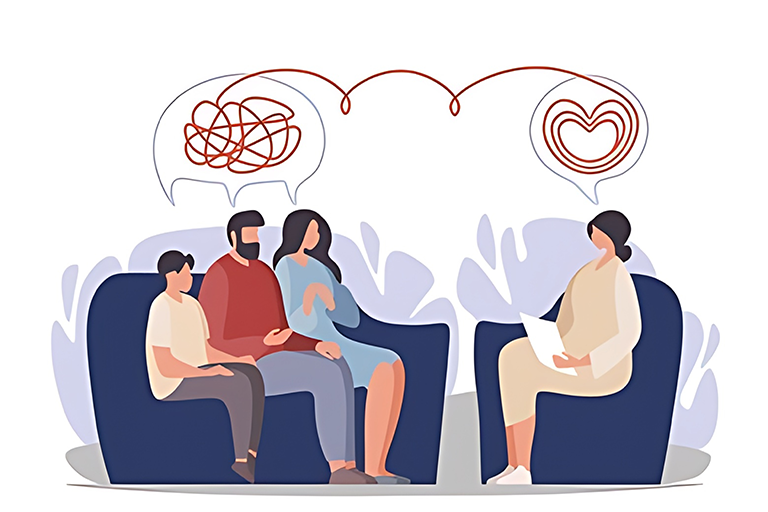“Navigating the Maze of Eating Disorders: Your Roadmap to Recovery”
Eating disorders are serious mental health conditions characterized by unhealthy behaviors related to food and body image. They often involve extreme preoccupations with weight, shape, and eating habits.
Eating disorders can have severe physical and psychological consequences, including malnutrition, heart problems, and depression. Treatment usually involves therapy, nutritional counseling, and medical supervision.
Early intervention is crucial for a better chance of recovery. It’s essential to seek help and support if you or someone you know is struggling with an eating disorder.
Let’s know about some common eating disorders:
-
Anorexia Nervosa:
Anorexia nervosa is perhaps one of the most well-known eating disorders. Individuals with anorexia have a relentless fear of gaining weight, leading them to engage in severe calorie restriction and excessive exercise. They often see themselves as overweight, even when they are dangerously underweight. This distorted body image can drive them to extreme measures, jeopardizing their health and well-being. Anorexia can result in malnutrition, brittle bones, heart issues, and even organ failure.
-
Bulimia Nervosa:
Bulimia is characterized by recurrent episodes of binge eating, where individuals consume unusually large amounts of food in a short time.
This is followed by compensatory behaviors, such as self-induced vomiting, laxative use, or excessive exercise, in an attempt to “undo” the binge. Unlike anorexia, people with bulimia often maintain a relatively stable weight, but they face serious risks to their physical and mental health due to frequent purging.
-
Binge-Eating Disorder:
Binge-eating disorder shares similarities with bulimia but lacks compensatory purging behaviors. People with this disorder frequently experience episodes of uncontrollable overeating, often in secret.
They may use food as a coping mechanism for emotional distress, leading to obesity and related health problems, including heart disease and diabetes.
-
Avoidant/Restrictive Food Intake Disorder (ARFID):
ARFID is different from other eating disorders in that it’s not primarily driven by concerns about weight or body image. Instead, individuals with ARFID have a restricted range of food preferences due to sensory sensitivities, aversions, or concerns about the taste or texture of certain foods. This can lead to nutritional deficiencies and challenges in social situations where food is involved.
-
Orthorexia:
Orthorexia is an obsession with eating only what is perceived as “healthy” or “clean” foods. While a focus on nutrition is generally a positive habit, orthorexia takes it to an extreme. People with orthorexia may avoid entire food groups, restrict their diets severely, and experience intense anxiety if they consume something they consider “unhealthy.” This can lead to malnutrition and social isolation.
Understanding these various eating disorders is crucial because they all have significant physical and psychological implications. Seeking professional help and support is vital for individuals struggling with these conditions to achieve recovery and improve their overall quality of life.

the physiological and psychological effects of each one of the disorders
Some of the physiological and psychological effects of each one of the disorders are summarized below:
Anorexia Nervosa:
Physiological Impact: Anorexia nervosa can lead to severe malnutrition, causing weakness, fatigue, and dizziness.
Psychological Impact: Anorexia often leads to distorted body image, intense fear of gaining weight, and feelings of low self-worth. Individuals may become obsessed with food, dieting, and perfectionism.
Bulimia Nervosa:
Physiological Impact: Bulimia nervosa, characterized by self-induced vomiting, can damage the oesophagus and erode tooth enamel due to stomach acid exposure.
Psychological Impact: Bulimia can result in feelings of shame, guilt, and anxiety surrounding food and eating. The cycle of binging and purging can lead to emotional turmoil and a sense of loss of control.
Binge-Eating Disorder:
Physiological Impact: Binge-eating episodes can result in weight gain, increasing the risk of obesity-related conditions such as diabetes and heart disease.
Psychological Impact: Binge-eating disorder is often accompanied by feelings of guilt, shame, and embarrassment due to the inability to control eating habits. This can contribute to low self-esteem and depression.
Avoidant/Restrictive Food Intake Disorder (ARFID):
Physiological Impact: ARFID’s limited food choices can lead to nutritional deficiencies, impacting overall health.
Psychological Impact: ARFID can lead to social isolation and anxiety in situations involving food. Individuals may feel self-conscious or anxious about their limited food choices.
Orthorexia:
Physiological Impact: Orthorexia’s extreme dietary restrictions can result in nutrient imbalances and potential health issues.
Psychological Impact: Orthorexia can result in increased anxiety and rigidity around food choices. People with orthorexia may experience distress when faced with “unhealthy” foods, leading to social isolation and reduced enjoyment of meals.
Understanding these physiological effects is crucial for recognizing the severity of eating disorders and the importance of early intervention. Seeking professional help is essential to mitigate these health risks and promote physical well-being in individuals struggling with these conditions.
the treatment plans associated with Eating Disorders
Let’s discuss the treatment plans associated with Eating Disorders:
When it comes to addressing eating disorders, it’s crucial to recognize that help is available. Effective treatments typically encompass a combination of medical, nutritional, and psychological support.
Medical and Nutritional Support:
– Medical professionals play a pivotal role in managing the physical complications associated with eating disorders. They monitor health, tackle nutritional deficiencies, and handle medical emergencies.
– Nutritional counseling is a fundamental component of treatment. It assists individuals in establishing healthier eating habits and gradually rebuilding a balanced relationship with food. Registered dietitians collaborate closely with patients to create customized meal plans.
Psychotherapy:
– Psychotherapy, also known as talk therapy, is a cornerstone of eating disorder treatment. One widely used approach is Cognitive Behavioral Therapy (CBT). CBT aids in recognizing and altering harmful thought patterns and behaviors concerning food, body image, and self-esteem.
– CBT for eating disorders revolves around identifying and challenging negative beliefs related to food and body image. It equips individuals with coping strategies to manage triggers and stressors without resorting to disordered eating behaviors.
– Through regular sessions with a trained therapist, individuals develop healthier attitudes toward food and their bodies, ultimately fostering a positive self-image.
Family-Based Treatment (FBT):
– Especially effective for adolescents with eating disorders, FBT engages the entire family in the treatment process. Parents take an active role in supporting their child’s recovery, helping them reestablish healthy eating patterns and restore weight.
Medication:
– In certain instances, medication may be part of the treatment plan. Antidepressants, anti-anxiety medications, or mood stabilizers can assist in managing co-occurring mental health conditions commonly associated with eating disorders.
Support Groups:
– Support groups offer a sense of community and understanding among individuals facing similar challenges. Sharing experiences and coping strategies can be a valuable aspect of the recovery process.
Hospitalization:
– In severe cases where individuals are at risk of medical complications or are unable to engage in outpatient treatment, hospitalization may be necessary to stabilize their condition.
It’s essential to customize the treatment plan to each individual’s specific needs. Early intervention and consistent support are crucial for successful recovery from eating disorders.
Remember that seeking help is a sign of strength, and with the right treatment and support, many people can achieve lasting recovery and regain a healthy relationship with food and their bodies!
Learn more: Mental Health Awareness
& Know about Your Confidant
Bijoylaxmi Das, Mental Health Blogger, Your Confidant





